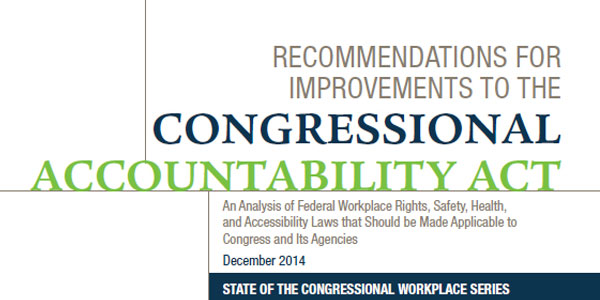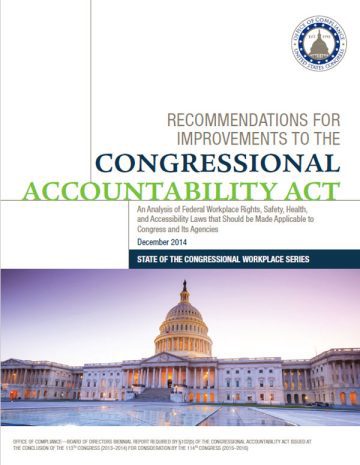STATEMENT FROM THE BOARD OF DIRECTORS
Next month we celebrate the twentieth anniversary of Congress’ passage of the Congressional Accountability Act of 1995 (CAA). This anniversary marks the establishment of the Congressional Office of Compliance (OOC) and the promise by Congress that it would hold itself to the same workplace rights protections for its employees that it requires in the public and private sectors. The Board of Directors believes now is the time to celebrate Congress’ many accomplishments in the area of workplace rights. However, it is also the time to acknowledge that much work remains, particularly in such areas as mandatory workplace rights training for staff, applying the Whistleblower Protection Act to the Legislative Branch, and increasing protections against retaliation in Occupational Safety and Health matters.
On the eve of this significant milestone, we are very pleased to submit to Congress these 2014 biennial recommendations for improvements to the CAA. In the coming year, we look forward to working with Congress to more fully realize the goal of parity with all workplace rights laws.
As part of Congress’ effort to bring accountability to itself and its instrumentalities, the CAA established the OOC to: administer a dispute resolution program for the resolution of claims by Legislative Branch employees under the CAA; carry out an education program to inform Congressional Members, employing offices, and employees about their rights and obligations under the CAA; inspect and investigate Legislative Branch facilities for compliance with safety and health and accessibility laws; and, under the guidance of the Board of Directors, promulgate regulations and advise Congress on needed changes and amendments to the CAA.
The CAA was drafted to provide for ongoing review of the workplace laws that apply to Congress. Section 102(b) of the CAA tasks the Board of Directors of the OOC to do just that. Thus, every Congress, the Board reports on:
(A) whether or to what degree [provisions of Federal law (including regulations) relating to (A) the terms and conditions of employment (including hiring, promotion, demotion, termination, salary, wages, overtime compensation, benefits, work assignments or reassignments, grievance and disciplinary procedures, protection from discrimination in personnel actions, occupational health and safety, and family and medical and other leave) of employees; and (B) access to public services and accommodations]1…are applicable or inapplicable to the legislative branch, and (B) with respect to provisions inapplicable to the legislative branch, whether such provisions should be made applicable to the legislative branch. The presiding officers of the House of Representatives and the Senate shall cause each such report to be printed in the Congressional Record and each such report shall be referred to the committees of the House of Representatives and the Senate with jurisdiction.
In keeping with this mandate, the report for 2014 analyzes certain “parity gaps” between Federal workplace rights laws that apply to employers in the private sector and Federal Executive Branch but do not apply to the Legislative Branch and recommends whether these laws should be incorporated into the CAA or made applicable to the Legislative Branch. This report also recommends pragmatic improvements to the CAA to make administering the CAA more efficient and effective.

